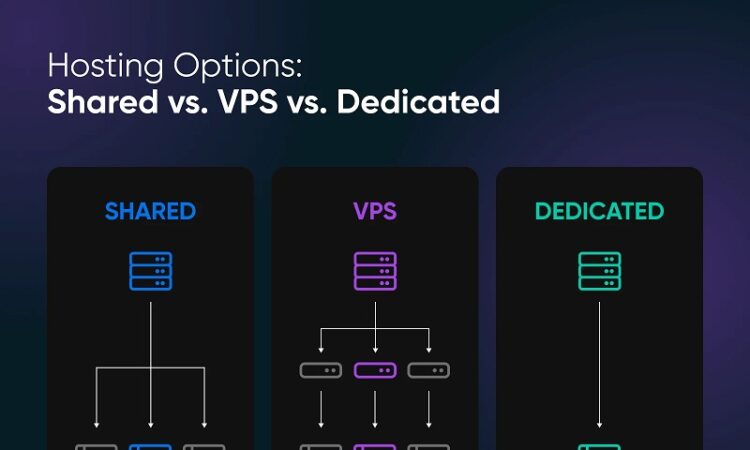
When we talk about launching a website or application, it’s crucial to start on the right foot by selecting the hosting plan that will fit your particular needs. However, with the availability of multiple choices, it can be overwhelming to understand which one suits your budget. After all, you won’t allow yourself to spend much on resources that they don’t use, nor want to wind up.
This article will jump into the world of shared hosting, VPS hosting, and dedicated hosting. In the bottom line, you will get clear knowledge of specific options and be equipped to make an informed decision.
Shared Hosting: Competitive and beginner friendly
Under this type of hosting, you will rent a server space on the server. For example, it’s like renting a room in an apartment complex. You share the resources of a single server with various websites. It is a nominal and beginner-friendly option.
Shared hosting is easy to start without breaking the bank or having technical know-how. The hosting provider is responsible for taking care of server administration, making it hassle-free for users.
However, there are advantages. Since you’re sharing resources, this will affect the performance of the website on the same server experience high traffic or resource usage – it is like rush hour traffic on a shared road.
Shared hosting is the best way to begin the journey for personal blogs, small business websites, or start-up level websites with low traffic. If you’re just beginning and want to start an economical option, shared hosting is worth considering. It gets started at a few dollars per month, making it best the choice for budget-conscious individuals.
VPS Hosting: The perfect balance
VPS hosting is like a bridge between shared hosting and dedicated hosting. Here, you take an apartment in a larger building. A particular website is allocated with dedicated resources within a virtual environment. With VPS hosting, you get resources like CPU power, RAM, and storage. This helps to get a better performance than shared hosting. Moreover, you get full control over server configuration helping to tailor them to your particular requirements.
Although web hosting on a VPS needs advanced or medium level technical knowledge, it’s not like a managing dedicated server. You can avail the benefits of advanced security, scalability, and customization without paying heavy costs.
VPS is the best solution for growing websites with moderate traffic, e-commerce stores, or web applications with particular needs. As websites move to new heights then it becomes necessary to scale up the resources to accommodate the increasing demand. The cost of SSD VPS hosting provider in USA plans varies provider to provider and as per the resources.
Dedicated Hosting: Power and Control Unleashed
Dedicated hosting is one of the strongest web hosting solutions in the web hosting industry. It is like owning a luxurious private villa. You have a full physical server at your disposal, exclusively for your website. This type of web hosting offers maximum control, performance and reliability. In dedicated hosting, you don’t share the resources with other websites, you have the freedom to use the full potential of the server. It’s like you’re the owner of the train and managing it all the way.
The level of control in dedicated hosting is unparalleled. You can customize server settings, install specific software, and tailor configurations as per your needs. This level of power is important for resource-intensive applications or websites with heavy traffic.
Dedicated hosting is suitable for large businesses, enterprise-level websites, or applications with high traffic and resource demands. You can check the price of dedicated hosting plans at SSD web hosting provider in USA and start your web hosting journey with dedicated hosting.
Comparison of Shared Hosting, VPS Hosting, and Dedicated Hosting
When choosing a hosting solution for your website, understanding the differences between shared, VPS, and dedicated hosting is crucial. Each option offers distinct levels of control, performance, and cost.
Shared Hosting
Multiple Websites: A single server hosts multiple websites.
Resource Sharing: It shares the resources like CPU, RAM and storage.
Cost-Effective: The most affordable option.
Limited Control: Minimal control over server configuration.
Performance: This may be affected by other websites on the server.
VPS (Virtual Private Server) Hosting
Virtualized Server: You can develop a virtual server within a physical server.
Dedicated Resources: Allocates dedicated resources (CPU, RAM, storage).
Greater Control: Offers more control over server configuration.
Scalability: You are allowed to scaled up or down.
Cost-Effective: More expensive than shared hosting but less than dedicated.
Dedicated Hosting
Entire Server: You have exclusive access to the whole physical server.
Complete Control: Full control over server configuration and software.
Optimal Performance: Provides the highest level of performance.
Costly: The most expensive option.
Maintenance: More technical expertise is required for maintenance.
When to Choose Which:
Shared Hosting: Ideal for small websites with low traffic and budget constraints.
VPS Hosting: Suitable for growing websites that need more control and performance than shared hosting.
Dedicated Hosting: Best for high-traffic websites, resource-intensive applications, or businesses requiring complete server environment control.
